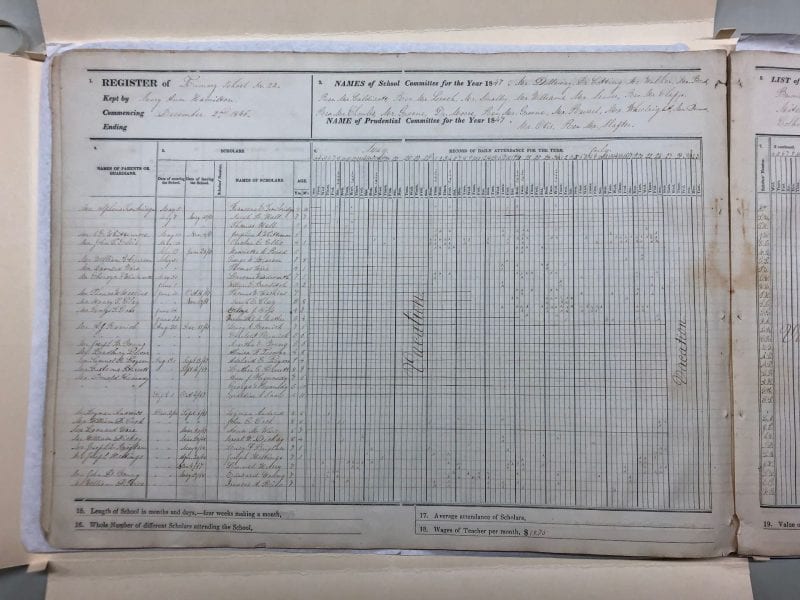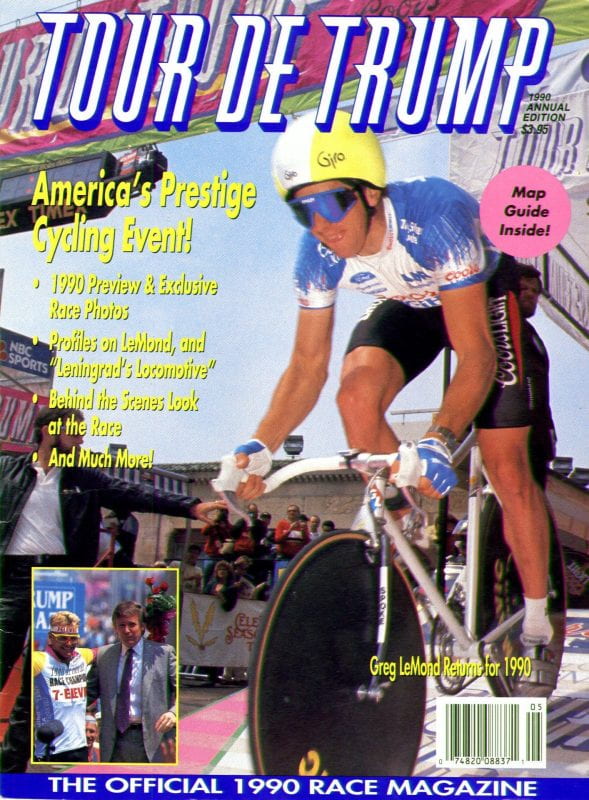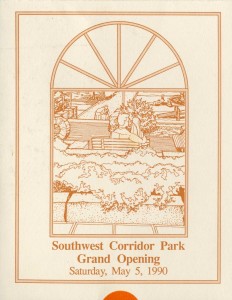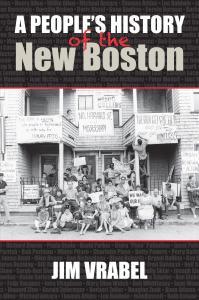University Archives & Special Collections (UASC) in the Joseph P. Healey Library at the University of Massachusetts Boston is pleased to announce that six collections of previously unavailable archival material are now open for research. This is the third in a series of posts to announce newly available collections, toward the goal of making all of UASC’s collections, both processed and unprocessed, open for research.
Collections that have not been processed, or that are minimally processed, will be made available upon request to researchers in approximately two to three weeks, depending on the size and complexity of the collection. Contact library.archives@umb.edu for more information.
To learn more about the collections that were made available this week, click the collection title in the list below.
- Town of Roxbury school register, 1846-1848: This register documents the activities of the primary school in the Town of Roxbury. The register was a result of the Statute of 1845 Chap. 157, enacted by the Senate and House of Representatives. The registers, intended to last five years, were provided to the school committees by the Secretary of State. The object of the register was to furnish the school committee with facts from which they could make their annual returns. The register also served to exhibit the condition of the school for a series of years, allowing for self-comparison and improvement. The register contains names of the members of the school committee, names of teachers and the value of their board per month, names of parents and guardians, names of students, students’ ages, the dates the students entered and left the school, a record of daily attendance, and a list of books prescribed by the school committee.
- Paul Atwood activist flyers and publications collection, circa 1968-1971: This collection includes flyers, pamphlets, and activist newspapers. Some of the significant topics represented in this collection include counter culture in Boston, the antiwar movement, the Vietnam War, United States politics of 1968, activism, the expansion of Harvard’s campus, Cambridge rent control, the Black Panthers, racism, and feminism.
- Activist Pamphlets collection, 1960-1979: This collection contains activist pamphlets, newspapers, and reports published locally, across the United States, and internationally. Some of the topics addressed in the collection include politics, labor, feminism, racism, war, and issues in Asia, Africa, Latin America, and the Middle East during 1960-1979.
- Resource file survey cards, circa 1981: These survey cards may have been created as a project after the University Archives and Special Collections department was established at the University of Massachusetts Boston in 1981. The cards contain descriptive data of various local activists and community and benevolent organizations and their records.
-
Tour de Trump ephemera, 1990: The Tour de Trump was a sporting event designed to showcase cycling’s elite and was intended to be America’s version of the Tour de France. The event was originally sponsored by Donald Trump’s Trump Plaza Hotel and Casino in Atlantic City, New Jersey, and was known as the Tour de Trump in 1989 and 1990. Materials consist of a map guide of the race and the Tour de Trump official 1990 race magazine.
- Roy Medeiros artwork, circa 1982-1984: The materials in this collection consist of five art pieces created out of spiral-bound notebooks by Roy Medeiros. The titles of the pieces are “Poker,” “Variations in Advertising,” “Self Portrait,” “American Flag Book,” and “Proud to be an American”.
For questions about these collections or to schedule a research appointment, please contact library.archives@umb.edu or 617-287-5469.
University Archives & Special Collections in the Joseph P. Healey Library at UMass Boston collects materials related to the university’s history, as well as materials that reflect the institution’s urban mission and strong support of community service, notably in collections of records of urban planning, social welfare, social action, alternative movements, community organizations, and local history related to neighboring communities.
University Archives & Special Collections welcomes inquiries from individuals, organizations, and businesses interested in donating materials of an archival nature that that fit within our collecting policy. These include manuscripts, documents, organizational archives, collections of photographs, unique publications, and audio and video media. For more information about donating to University Archives & Special Collections, click here or email library.archives@umb.edu.







![SC-0137_IV_f1_001 Southwest Corridor Project. Relocated Orange Line/railroad improvements, [1977]](https://i0.wp.com/blogs.umb.edu/archives/files/2015/10/SC-0137_IV_f1_001-1w0gf1v.jpg?w=94&h=155&ssl=1)



